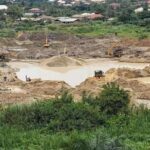The Chamber of Aquaculture Ghana (COA) is calling for a major shift in government funding to strengthen the country’s aquaculture sector and reduce Ghana’s heavy reliance on fish imports, which reportedly cost the nation over $250 million annually.
Chief Executive Officer of the Chamber, Jacob Adzikah, argues that despite aquaculture showing strong growth potential, it remains underfunded while marine and inland fisheries, both facing rapid depletion, receive the bulk of government resources.
“The marine and inland side are depleting very fast, and aquaculture keeps on showing promising signs. The data from there keeps on going up each year, and it appears the sector that is doing very well is receiving less resources,” Adzikah told journalist on the sideline of an event celebrating women in aquaculture to commemorate 2025 International Women’s Day.
“We think that it’s time to increase budget allocation to the aquaculture sector because if you allocate more resources to that sector, we can actually scale up production and also increase our contribution to the country’s GDP,” he added.
Ghana’s fisheries sector relies on three main sources: marine, inland, and aquaculture. However, overfishing, climate change, and regulatory gaps have led to the rapid depletion of marine and inland fish stocks. Meanwhile, aquaculture is growing steadily but struggling to reach its full potential due to poor investment and limited access to financing.
Jacob Adzikah stressed that increasing support for aquaculture would not only boost local production but also ease the burden on the country’s foreign exchange reserves.
“If Ghana is importing over 250 million USD worth of fish each year and we support the aquaculture sector, we can produce a lot locally, and this will go a long way to reduce the amount of volume we are importing from other parts of the world,” he said.
“It will also reduce the pressure on demand for foreign exchange to import fish into the country,” he added.
The Chamber further highlighted the disparity in subsidies, with marine and inland fisheries benefiting significantly more than aquaculture.
“If you look at the kind of subsidies that the marine and inland sectors are receiving—talk about the premix fuel subsidies, the outboard motor subsidies, infrastructure support like cold room facilities and fish processing infrastructure—a lot is going to those sectors,” Mr. Adzikah explained.
The COA boss called on the Ministry of Fisheries and Aquaculture Development and the Fisheries Commission to address this imbalance.
“As a Chamber of Aquaculture representing industry players, we are advocating that the ministry should consider allocating more resources to the aquaculture sector this time around,” he said.
Another major challenge, according to Adzikah, is access to financing, particularly for women in the aquaculture industry. Many struggle to secure funding due to the perception that aquaculture is a high-risk investment.
“At the moment, it is very difficult for women to have access to financing to scale up their businesses, largely because it is assumed that aquaculture is a high-risk area, and financial institutions are not willing to lend a lot of resources to women in aquaculture,” he noted.
Adzikah called for a concerted effort from stakeholders to change this narrative.
“We need to work hand in hand with other stakeholders to de-risk aquaculture. If we are able to do that, financial institutions will be willing to lend more resources to enterprises operating in the aquaculture sector,” he urged.
With global trends shifting towards aquaculture as a sustainable alternative to dwindling fish stocks, Adzikah insists Ghana must act now.
“A lot of countries are really investing resources into the aquaculture sector because they realize that is the alternative for the depleted resources in the marine sector,” he said.
He stressed that Ghana has one of the best ecosystems for fish production, making it well-positioned to expand aquaculture and that expanding aquaculture could provide sustainable employment opportunities for Ghanaians.













